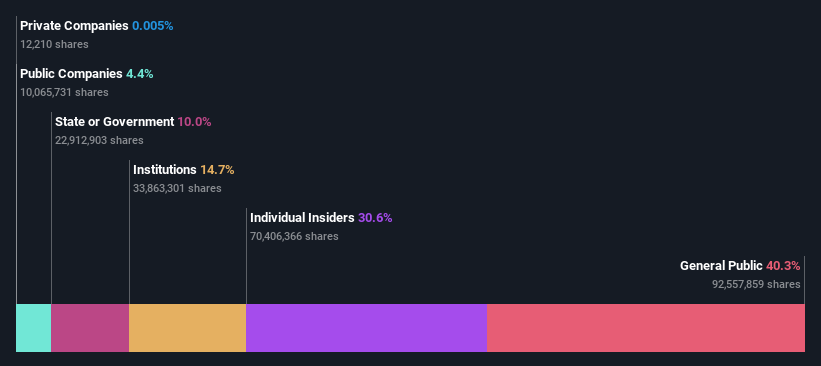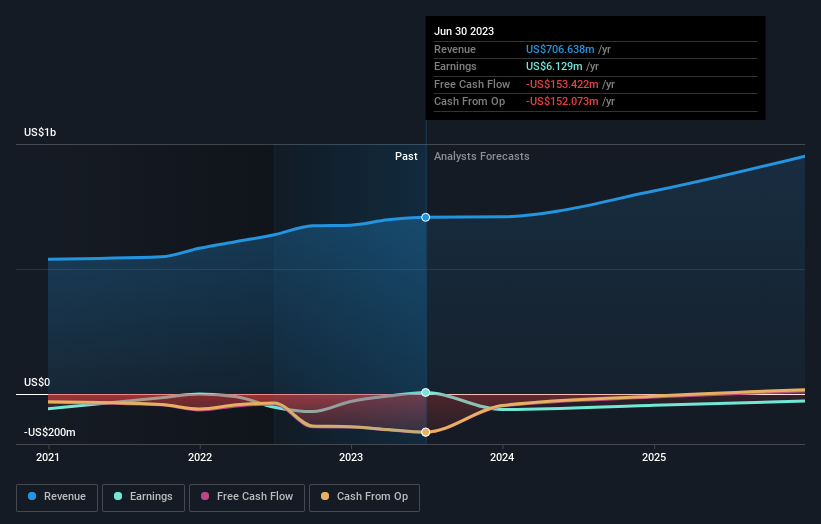Individual investors are Rubicon Technologies, Inc.'s (NYSE:RBT) biggest owners and were hit after market cap dropped US$97m
Key Insights
Rubicon Technologies' significant individual investors ownership suggests that the key decisions are influenced by shareholders from the larger public
A total of 7 investors have a majority stake in the company with 52% ownership
If you want to know who really controls Rubicon Technologies, Inc. (NYSE:RBT), then you'll have to look at the makeup of its share registry. With 36% stake, individual investors possess the maximum shares in the company. That is, the group stands to benefit the most if the stock rises (or lose the most if there is a downturn).
While insiders, who own 27% shares weren’t spared from last week’s US$97m market cap drop, individual investors as a group suffered the maximum losses
Let's delve deeper into each type of owner of Rubicon Technologies, beginning with the chart below.
View our latest analysis for Rubicon Technologies
What Does The Institutional Ownership Tell Us About Rubicon Technologies?
Institutional investors commonly compare their own returns to the returns of a commonly followed index. So they generally do consider buying larger companies that are included in the relevant benchmark index.
We can see that Rubicon Technologies does have institutional investors; and they hold a good portion of the company's stock. This implies the analysts working for those institutions have looked at the stock and they like it. But just like anyone else, they could be wrong. If multiple institutions change their view on a stock at the same time, you could see the share price drop fast. It's therefore worth looking at Rubicon Technologies' earnings history below. Of course, the future is what really matters.
Rubicon Technologies is not owned by hedge funds. The company's largest shareholder is Jose Enrich, with ownership of 27%. Meanwhile, the second and third largest shareholders, hold 10.0% and 3.9%, of the shares outstanding, respectively.
We also observed that the top 7 shareholders account for more than half of the share register, with a few smaller shareholders to balance the interests of the larger ones to a certain extent.
Researching institutional ownership is a good way to gauge and filter a stock's expected performance. The same can be achieved by studying analyst sentiments. There are plenty of analysts covering the stock, so it might be worth seeing what they are forecasting, too.
Insider Ownership Of Rubicon Technologies
While the precise definition of an insider can be subjective, almost everyone considers board members to be insiders. The company management answer to the board and the latter should represent the interests of shareholders. Notably, sometimes top-level managers are on the board themselves.
Most consider insider ownership a positive because it can indicate the board is well aligned with other shareholders. However, on some occasions too much power is concentrated within this group.
Our information suggests that insiders maintain a significant holding in Rubicon Technologies, Inc.. It has a market capitalization of just US$210m, and insiders have US$57m worth of shares in their own names. We would say this shows alignment with shareholders, but it is worth noting that the company is still quite small; some insiders may have founded the business. You can click here to see if those insiders have been buying or selling.
General Public Ownership
The general public-- including retail investors -- own 36% stake in the company, and hence can't easily be ignored. This size of ownership, while considerable, may not be enough to change company policy if the decision is not in sync with other large shareholders.
Public Company Ownership
Public companies currently own 3.9% of Rubicon Technologies stock. We can't be certain but it is quite possible this is a strategic stake. The businesses may be similar, or work together.
Next Steps:
It's always worth thinking about the different groups who own shares in a company. But to understand Rubicon Technologies better, we need to consider many other factors. To that end, you should learn about the 5 warning signs we've spotted with Rubicon Technologies (including 4 which can't be ignored) .
If you are like me, you may want to think about whether this company will grow or shrink. Luckily, you can check this free report showing analyst forecasts for its future.
NB: Figures in this article are calculated using data from the last twelve months, which refer to the 12-month period ending on the last date of the month the financial statement is dated. This may not be consistent with full year annual report figures.
Have feedback on this article? Concerned about the content? Get in touch with us directly. Alternatively, email editorial-team (at) simplywallst.com.
This article by Simply Wall St is general in nature. We provide commentary based on historical data and analyst forecasts only using an unbiased methodology and our articles are not intended to be financial advice. It does not constitute a recommendation to buy or sell any stock, and does not take account of your objectives, or your financial situation. We aim to bring you long-term focused analysis driven by fundamental data. Note that our analysis may not factor in the latest price-sensitive company announcements or qualitative material. Simply Wall St has no position in any stocks mentioned.

 Yahoo Finance
Yahoo Finance 

